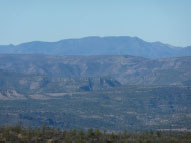Northern Colorado Bird Alliance Presents
Dr. Richard Knight
“The Wisdom of the Sierra Madre: Apache, Leopold, and the Land Ethic”
Thursday, October 9th, 2025
Refreshments 7:00;
Announcements 7:20;
Presentation 7:30;
Fort Collins Senior Center, 1200 Raintree Dr.
***This program will also be accessible online using Zoom***
It will also be viewable in-person at the Senior Center.
Enter the following link on your web browser at 7 p.m. and follow the instructions to join the meeting virtually: https://us02web.zoom.us/j/89340703429

Corrales de los Indios (Geronimo's hideout in the Sierra Madre). Photo by Richard Knight.
Aldo Leopold once wrote, “for the first time in my life I was seeing land in perfect aboriginal health.” How could Leopold, a land doctor, create the land ethic if he had not heretofore seen land as it looked in “perfect” health. The answer lies in two bow-hunting trips he took to the Rio Gavilan Watershed in Mexico's northern Sierra Madre in the mid-1930s. Unbeknownst to the outside world, not all Apache surrendered to General Miles in 1886. The presence of these indigenous people still living in the Sierra Madre had kept the miners, loggers, ranchers, and hunters out of this part of the Sierras. These experiences provided Leopold with the final ingredient to complete his land ethic.
Richard Knight works at the intersection of land use and land health in the American West. A professor of wildlife conservation at Colorado State University, he sits on a number of boards including the Colorado Cattlemen's Agricultural Land Trust, the Science Board of the Malpai Borderlands Group, The Partnership of Rangeland Trusts, The Land Conservation Assistance Net-work, and the Colorado Land Library. He was formerly on the Board of Editors for both Conservation Biology and Ecological Applications. In 2007, CSU honored him with the Board of Governors Excellence in Teaching award. He is a five-time recipient of the Student's Choice for Favorite Faculty Member in the Warner College of Natural Resources. His most recent book (2020) is Twenty-five Years of Keeping Working Lands in Working Hands: The Story of the Colorado Cattlemen's Agricultural Land Trust.
Join us October 9th for this informative program that is free and open to the public.